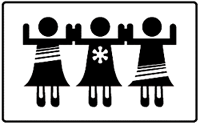 |
|||||||||||||||
|
|||||||||||||||
|
|||||||||||||||
| Young Women Work. Community Economic Development to Reduce Women's Poverty
and Improve Income |
|
||||||||||||||
|
M. McCracken, K. Dykman,
F. Parent, I. Lopez EXECUTIVE SUMMARY Young women work - in their homes, in our community, in schools, with other youth and in the labour force. But young women who live in poverty continue to find themselves unable to make our economy or society work for them. Struggling to stay in school, working for low wages, and lacking childcare, young women face many challenges. At risk of a future living in poverty, and possibly raising another generation to do the same, young women told us they want to work to build a better future and community. How do we support them to do this? By believing in young women's capacity to learn, grow and thrive, and providing them with suitable supports and encouragement to do so. Community Economic Development (CED) is emerging as a supportive, sustainable and empowering means to end poverty among young women. It starts by understanding young women's practical needs for food, shelter, childcare, transportation; and their strategic needs for education, equitable wages, and equal gender division of labour; and reproductive choice. Both practical and strategic needs are important, and need to be included in programs with young women. Moreover, a strong safety net and supports such as adequate housing and childcare are required in order for young women to participate in CED. This is a participatory feminist research project which sought to describe the barriers and opportunities for young women in the "new" economy, and outline Community Economic Development approaches to preventing poverty among young women ages 15 - 24. We worked with young women in two-inner city Winnipeg neighbourhoods, and asked them which community supports they used, in order to understand how we could build CED approaches into the current network of community-based organizations they already access. We talked to 50 young women, the majority of whom are Aboriginal. We asked them about their neighbourhoods, unpaid and paid work, school, computers, motherhood, teenage pregnancy, role models, and what they hoped for in their futures. Young women face formidable challenges to improving their economic status and quality of life. Growing up in poverty means that options are limited. The schools they attend are not necessarily culturally relevant for Aboriginal peoples, and they may have difficulties getting to school because of a lack of support and encouragement in their lives. Young mothers lack community supports and childcare to enable them to go to school, or work for pay. Educational programs that segregate teen mothers may isolate them and restrict the course options they have available. Young women are concerned with meeting their basic needs for safe and adequate shelter and healthy food. Access to skills development with computers, and to computers themselves is limited. Young women want to work for pay, but are often limited to finding low paying jobs in fast food restaurants or babysitting. They have ideas of the types of jobs they want to do when they "grow up", but these are influenced by the career guidance they receive. They want better lives for themselves, but have a limited understanding of what it takes to get there. Young women had little demonstrated knowledge of what kind of education and training it takes to achieve different professional designations. They had little true understanding of the earnings they would need when they are older, and what kind of material quality of life this would translate into. This research project also included a scan of programs offered in inner-city Winnipeg. It found that community supports available to young women are limited, and generally concerned with young women's health. Community supports generally served practical needs for food, shelter, health services and education, and there is a lack of programming that incorporates economic skills and economic development for young women. Aboriginal young women want and need supports around them that uphold their traditional cultures and teachings. These activities are important for their identity formation and well-being, and need to be available in all aspects - for pregnant and mothering young women, in educational programs, and in skills and paid work programs designed for young women. In order for young women to build a strong future for themselves and their families, they require adequate supports to do so. This includes motivation and supports to stay in school. It is also important to help young women make the link between their choices today and the implications for the future. This needs to happen not only in terms of paid work and career guidance, but for birth control, pregnancy, reproductive choice and motherhood as well. Young women in this study demonstrated incredible possibilities for improving their quality of life and income. They wanted to give back to their communities and work with other youth, and develop and share their cultural identities. They wanted to help other youth, by inspiring and motivating them, and supporting them to stay in school. As young mothers, they want access to education and training so they can be better parents for their children in the long term. This requires childcare that is close to their home or school. To be good parents, they also need supports and breaks from their children to reduce stress and isolation. This study finds that programming and supports need to encompass both young women's practical daily needs and their strategic long term needs, for both are equally important. This study has a variety of implications for Community Economic Development approaches to preventing poverty and improving the incomes of young women. It finds that a strong social safety net is a key support to economic development efforts with young women. Young women also require safe, welcoming spaces in order to participate in programming. The study finds that CED approaches should be centred on young women's needs - childcare was most frequently mentioned as a key component of any support to young mothers, for example. CED must consider the long-term benefits for women to improve their wages and economic security by building transferable skills that are valued in the economy. Moreover, these should be guided and led by young women themselves, who identified that they wish to have the opportunity to lead the next generation of youth. Finally, this study found that many of the supports young women are accessing do not incorporate economic skills. This restricts the scope of the programs to meeting only practical needs, however we must remember that much gender inequality is inextricably linked to economic equality. More supports and incentives need to be developed at every site where young women access services to assist them to build their economic skills, find meaningful work, and plan for their futures. Partnerships between organizations with different core competencies can result in holistic programming to this end. For example, CED organizations can partner Aboriginal organizations, and women's organizations, to build on the strengths of each. The study concludes with suggestions and ideas for CED emerging from the findings of this research study. The following key features are identified as essential and should be incorporated to support young women's success in the programs:

Back to top of page |
|||||||||||||||
This website is copyrighted by the
Prairie Women's Health Centre of Excellence, © 1998-2011.
Website design: Pamela Chalmers E-mail: pwhce@uwinnipeg.ca. |
|||||||||||||||
 |
|||||||||||||||


 Full
Report ENG (.pdf) 1.1MB
Full
Report ENG (.pdf) 1.1MB